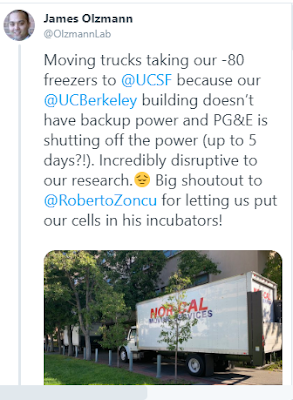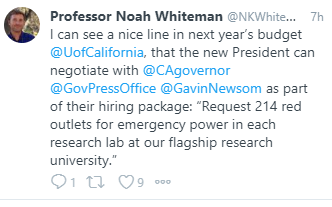Faculty- You Are the Captain of Your Ship
My heart goes out to UC Berkeley researchers that literally had the plug pulled on their research. Pacific Gas and Electric (PG&E) has initiated a series of power shut-downs to curtail potential wildfires sparked by their power lines in the Bay Area. A few years ago their equipment led to a massive wildfire where they were found liable, so this move attempts to limit their exposure-- by cutting off power to 2.5 million people for up to 6 days.
This causes unbelievably hard problems for folks in need of power to run medical electrical equipment etc, so it there are significant issues here that reach beyond inconvenience. That said, this is an important note to faculty (and postdocs and students) about the limits of a university to help with a major crisis-- no matter how good the facilities people are, you can't count on the system to save you.
That reality as researchers proactively took charge to save their critical resources. I have a funny feeling that it is only a few of them too, and that most are waiting for the Power Fairy to help out.
Twitter showed a case where one UC Berkeley researcher was moving the lab's -80°C freezers to UCSF to keep them cold. Frankly I would have gone for the super-long extension cord, but that's me and my obsession with comically large versions of stuff.
This hit many researchers especially hard, and Associate Professor Noah Whiteman took to Twitter to ping folks in the university-system hierarchy from the Governor to the Vice Chancellor. That's a good move, and certainly illuminates the state of infrastructure in public universities, but it doesn't keep the cells cold.
My advice to faculty, when your name is on the lab door it must become your responsibility to ensure that the necessary resources for your lab are in place. You can't count on a university when a massive catastrophe hits, and when you build universities on fault lines, tornado alleys and hurricane haunts you need to have a plan beyond the university's. Yes, universities hire outstanding people (like we certainly do) to address these issues, but there are only a few of them, while there are hundreds of faculty watching the sand run through the hourglass as a career's worth of valuable cells slowly thaws to death.
I live in hurricane land, and power can be interrupted for days. While some rooms in my building have backup power from a local diesel generator, my lab has no backup outlets. Knowing this, I own a giant generator and a 200 ft power cord with a 220 V plug -- just to run to my -80°C freezer if needed. I keep about 20 gallons of gas on hand during hurricane season and a full tank in the car and truck when hurricanes are approaching. I also can run other cords to 110V freezers to protect tens of thousands of dollars worth of enzymes and other labile materials.
In 18 years at the University of Florida I only had to get it on the truck and over to the lab one time, and as I was going to fire up, the power went back on.
The point is this-- part of your lab's long-term success depends on
your personal crisis plan to insulate your research program from disaster. This is on us as faculty. Yes we pay >50% of every grant dollar to the university for overhead, but that can't adequately fund a safety net for when catastrophe hits.
The other reality is that our universities should be on the cutting edges of alternative power, and every building should be off grid and on solar, wind, and the on-campus nuclear plant. A man can dream.
The take-home message is that if it is critical to your operation do not count on someone else to take care of it. This is especially true in the crumbling infrastructure of our nation's public science enterprise. As the captain of the ship, develop a backup plan and a strategy to save the resources necessary for your program to succeed.
This causes unbelievably hard problems for folks in need of power to run medical electrical equipment etc, so it there are significant issues here that reach beyond inconvenience. That said, this is an important note to faculty (and postdocs and students) about the limits of a university to help with a major crisis-- no matter how good the facilities people are, you can't count on the system to save you.
That reality as researchers proactively took charge to save their critical resources. I have a funny feeling that it is only a few of them too, and that most are waiting for the Power Fairy to help out.
Twitter showed a case where one UC Berkeley researcher was moving the lab's -80°C freezers to UCSF to keep them cold. Frankly I would have gone for the super-long extension cord, but that's me and my obsession with comically large versions of stuff.
Moving trucks haul precious cargo of fragile frozen cells and other materials to another campus thanks to PG&E power outages. Hopefully they won't hit traffic. Good luck with that.
This hit many researchers especially hard, and Associate Professor Noah Whiteman took to Twitter to ping folks in the university-system hierarchy from the Governor to the Vice Chancellor. That's a good move, and certainly illuminates the state of infrastructure in public universities, but it doesn't keep the cells cold.
He's right, but universities are strapped for cash under the current federal science funding situation and backup power is probably pretty far down the list.
My advice to faculty, when your name is on the lab door it must become your responsibility to ensure that the necessary resources for your lab are in place. You can't count on a university when a massive catastrophe hits, and when you build universities on fault lines, tornado alleys and hurricane haunts you need to have a plan beyond the university's. Yes, universities hire outstanding people (like we certainly do) to address these issues, but there are only a few of them, while there are hundreds of faculty watching the sand run through the hourglass as a career's worth of valuable cells slowly thaws to death.
I live in hurricane land, and power can be interrupted for days. While some rooms in my building have backup power from a local diesel generator, my lab has no backup outlets. Knowing this, I own a giant generator and a 200 ft power cord with a 220 V plug -- just to run to my -80°C freezer if needed. I keep about 20 gallons of gas on hand during hurricane season and a full tank in the car and truck when hurricanes are approaching. I also can run other cords to 110V freezers to protect tens of thousands of dollars worth of enzymes and other labile materials.
In 18 years at the University of Florida I only had to get it on the truck and over to the lab one time, and as I was going to fire up, the power went back on.
The point is this-- part of your lab's long-term success depends on
your personal crisis plan to insulate your research program from disaster. This is on us as faculty. Yes we pay >50% of every grant dollar to the university for overhead, but that can't adequately fund a safety net for when catastrophe hits.
The other reality is that our universities should be on the cutting edges of alternative power, and every building should be off grid and on solar, wind, and the on-campus nuclear plant. A man can dream.
The take-home message is that if it is critical to your operation do not count on someone else to take care of it. This is especially true in the crumbling infrastructure of our nation's public science enterprise. As the captain of the ship, develop a backup plan and a strategy to save the resources necessary for your program to succeed.




